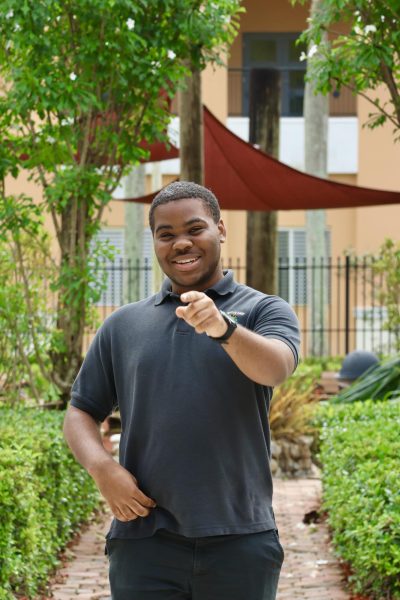After successfully completing his 30th show residency, “No Me Quiero Ir de Aquí” (“I don’t want to Leave Here”), Bad Bunny shocked the world with one more invitation for “No Me Quiero Ir de Aquí: Una Más” (“I don’t want to Leave Here: One More”). After selling out every one of his concerts, he would perform one last show, which would be live-streamed on multiple platforms for the entire world to experience.
This milestone show took place Sept. 20, marking the eighth anniversary of Hurricane Maria—a raging category 4 storm that ripped apart the island. Yet what remains the most remarkable about Bad Bunny’s last concert was his undeniable ability to unite communities of all ages through his music. Pembroke Pines Charter High School Junior Laura Cervantes shares her fond admiration for his ability to “combine so many different genres like trap, reggaeton, salsa, and dembow into a way that could appeal to all generations.”
With the purpose and meaningful intention to connect with his audiences, Bad Bunny decided to keep all his concerts in Puerto Rico, excluding the United States from his tours. In an interview, he shared his fear of U.S. Immigration and Customs Enforcement (ICE) raiding his concerts and stripping people from their families. An interruption to his performance that Senior Matthew Mercado explains would “take away from the themes of togetherness and the embracing of culture that Bad Bunny wants to represent through his tour.”
Bad Bunny shares with i-D magazine, “People from the U.S. could come here to see the show. Latinos and Puerto Ricans of the United States could also travel here, or to any part of the world.” Although many fans were disappointed in not having the opportunity to see their favorite artist live, many did just as Bad Bunny said. They purchased tickets and booked flights with the intention and absolute determination to see the residency first-hand.
Videos have gone viral of people on flights singing his songs as they prepared for this once-in-a-lifetime experience. Senior Emily Martinez was one of the fortunate Charter students who had the opportunity to see the concert live, describing it as a “surreal experience. It felt so different from his concerts here, almost magical, like I was part of something so special.”
Although having to travel to Puerto Rico to watch is more complicated than simply showing up to the concert venues in U.S. cities, fans found Bad Bunny’s decision to be quite honorable. Cervantes expresses that she found it to be “Admirable. He gave up huge potential earnings to protect his Hispanic community. There aren’t many artists out there who would do that, so I feel like it made many people, including myself, gain a lot of respect for him.”
Even those who didn’t get the opportunity to watch him live had the chance to experience his 31st concert by displaying the show on their television screens at home. Families gathered together, dressed in their Puerto Rican outfits, ready to dance and to sing, even if it was through a screen.
His album Debi tirar mas fotos (DtMF) completely revolutionized the Hispanic music industry by implementing both old and modern elements of Puerto Rican music. The blending of these factors created a nostalgic feel to those older generations, yet still resonated with those who are younger.
The use of Puerto Rican instruments like the 10-string cuatro and Gurio and different genres of music like salsa and reggaeton made it a unique gift to those in all walks of life. Mercado describes it as “taking what was already good about the reggaeton music industry and turning it into something memorable and heartfelt. It gives me chills every time.”
Not only did this album connect the Island of Puerto Rico, but it also united people of all cultures. Senior Armando Ayala explains that “you don’t have to be from a specific country or speak a language to enjoy music.” People from all over the world were listening to the new album and relating to the situations that were presented within the songs. This created a comforting feeling of representation, whether they spoke Spanish or not.
Like many students at Charter, Ayala has family back in his home country of Venezuela and can only communicate with them through occasional video calls. Throughout this album, Bad Bunny references the importance of never forgetting your culture and never being ashamed of your heritage. Ayala proclaims that this is “another thing that everyone who’s from origins outside the U.S. should learn. They need to be proud of where they’re from.”
Only a week after his historical No Me Quiero Ir de Aquí: Una Más show, Bad Bunny announced his NFL halftime show appearance, taking place Feb. 8, with millions of viewers expected to watch. The video releasing this information was shown with him atop a football goalpost in a completely Puerto Rican way, wearing a pava hat, chanclas, and a Hector-Lavoe inspired suit.
This sparked controversy due to rising deportation tensions in the U.S. and the ICE raids that have become more common. Negative responses have echoed throughout America from the built-up resentment of Latinos being viewed as “perpetual foreigners.” However, many others are ecstatic about what this could mean for all Hispanic communities, who will be represented in this solely Spanish-speaking performance.
Some are even calling it a “protest move” that is proving that one way or another, Bad Bunny is going to perform in the U.S. Ayala points out, “It’s showing the government that no matter how many times they try to take Hispanic people out and forget about them, they will always come back.”
Amidst the divided viewpoints, the love for Bad Bunny and his newest album has undeniably resonated throughout generations, over cities, and across oceans—especially with his last concert. No matter the language spoken or the culture one’s from, these songs have reminded people about the importance of loving one another, taking pictures, and never forgetting where you come from. Just like the album says: Mientras uno está vivo, uno debe amar lo más que pueda—(As long as one is alive, one should love as much as possible).















